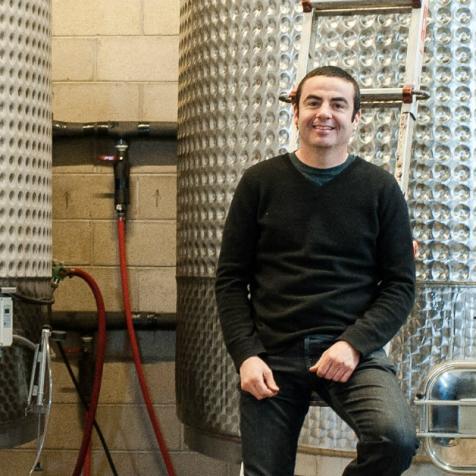
The Infinite Monkey Theorem Urban Winery
By Eric Peterson | Jun 21, 2015
Company Details
Location
Denver, Colorado
Founded
2008
Ownership Type
Private
Employees
12
Products
Wine
www.theinfinitemonkeytheorem.com
Denver
Founded: 2008
Privately owned
Employees: 12
Founder Ben Parsons is expanding his "urban winery" to Austin after winemaking in Denver proved the concept. His canned wines and ciders are setting the pace for the industry.
The U.K.-born Parsons went from selling wine in London to winemaking in Australia before landing in Colorado in 2001. He made stops at Canyon Wind Cellars in Palisade and Sutcliffe Vineyards in McElmo Canyon before moving to Denver to implement his business plan for an "urban winery."
"I used to drive wine around Colorado because we could self-distribute," he says. "I thought, 'Why is the winery six hours away from the people who buy the wine?' Eighty-five percent of the people live on the Front Range. Why not bring the winery to the people?"
He describes his brand as "back alley” and "gritty” and true to form, he started in a Quonset hut near 6th Avenue and Santa Fe Drive in Denver. He graduated to a slick winery and taproom in the city's gritty (but increasingly chic) RiNo area in 2012.
The goal? "Cutting through the bullshit" of winemaking, says Parsons. "It's a manufacturing process. You can do it anywhere -- you can make wine in a back alley in Denver."

He moved from an all-volunteer bottling crew to a staff of 12 employees between the bar, the office, and the winery. "I kind of float," says Parsons. "My role has become national salesperson."
His unpretentious approach is now centered kegged wine and canned wine, with bottled wine made from mostly Colorado grapes. The state's grape growers, however, can't supply enough to meet the needs for IMT's kegs and cans -- those grapes are from California.
And that's not likely to change, considering the can sales curve. Infinite Monkey Theorem is now in 41 states with its canned wines and ciders after launching cans in 2011. After selling 5,000 case-equivalents worth of cans in 2013, it shipped 12,000 cases worth in 2014 and Parsons expects to come close to doubling that mark in 2015. Cans are about 75 percent of total production and the distribution map has grown to include nearly 40 states.
There are only a few other canned wines on the market, and Parsons consulted on the biggest such launch to date: the Wine Group's new Flipflop cans. "We helped them on it," he says. He doesn't see it so much as competition but a higher tide for canned wines. "It's great for us."

After launching kegged wine at Table 6 in Denver in 2009, IMT has 80 keg accounts today, as keg growth outpaces bottle growth. For restaurants and bars, it's about getting more bang for the buck. "By glass, 12 percent goes down the drain, versus zero with kegs," says Parsons. " The first glass in that keg should be the same as the last glass."
Parsons says the demographics of both Denver and Austin -- where IMT is opening on South Congress Avenue in late 2015 -- are ideal, as is the fact that they're nowhere near Napa Valley. The Austin location will source grapes from vineyards in the Texas Panhandle and Hill Country.
"We're bringing the winemaking to non-established wine states," he explains. "We've proven you can make good wine from Colorado grapes and everybody is benefiting from it. Why wouldn't I do it in Austin?"
Challenges: Educating the consumer about canned wine: It's more sustainable, it's great for preservation, and there's no flavor impact. "It's just a matter of time," says Parsons, alluding to Oskar Blues leading the way for can mania in craft beer. "We're just ahead of the curve."
Merchandising canned wine is another challenge. "Where do you put it in a liquor store?" asks Parsons. "It's uncharted territory."
Kegs require infrastructure and education as well. "Obviously, it's easier if you're a new restaurant and still planning to build your bar," says Parsons. "But what's the branding opportunity? How do you sell it?"

Opportunities: New wineries. Nashville, Madison, Wisconsin, and Portland, Oregon, are on Parsons' list.
"There are just so many opportunities for cans," he adds. For starters, everyplace that doesn't allow glass -- airplanes (IMT is already on Frontier flights), sports stadiums, concert venues -- is a target. He's already in Sports Authority Field at Mile High, with his eyes set on Red Rocks.
Cider is another opportunity, he adds. "The cider category is growing faster than wines."
Needs: Another Denver location to handle production growth. "We're actually going to buy it," says Parsons, musing on the possibility of establishing an Infinite Monkey Theorem distillery next door to take advantage of an abundance of local fruit.
IMT will also be in the market for a new canning line if the company moves the existing Wild Goose one in Denver to Austin. Parsons says he'll look back to Wild Goose for the replacement.
"We need more space, more equipment, more sources of grapes, and more employees as we grow," Parsons says. "We're tiny. We're all overworked and underpaid. We're doing the work of 30 people."
